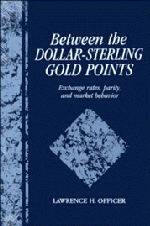Book contents
- Frontmatter
- Contents
- List of figures
- List of tables
- Preface
- List of symbols
- 1 Introduction
- Part I Monetary standards
- Part II Exchange rate
- Part III Gold points
- Part IV External and internal integration
- Part V Market efficiency
- Part VI Regime efficiency
- 14 Market forces
- 15 Policy variables
- 16 Net outcome
- Part VII Conclusions
- Notes
- References
- Index
14 - Market forces
Published online by Cambridge University Press: 13 October 2009
- Frontmatter
- Contents
- List of figures
- List of tables
- Preface
- List of symbols
- 1 Introduction
- Part I Monetary standards
- Part II Exchange rate
- Part III Gold points
- Part IV External and internal integration
- Part V Market efficiency
- Part VI Regime efficiency
- 14 Market forces
- 15 Policy variables
- 16 Net outcome
- Part VII Conclusions
- Notes
- References
- Index
Summary
Definition of regime efficiency
Two concepts of gold-standard efficiency are explored in this study. Market efficiency, involving the behavior of private parties in response to the profit opportunities afforded by the gold standard, was the topic of part V. Gold-point arbitrage (GPA) market efficiency was tested empirically for three time periods: 1890–1906, 1925–31, and 1950–66. Uncovered and covered interest arbitrage (UIA, CIA) and forward speculation (FS) efficiency were tested only for 1925–31.
Related to market efficiency but distinct is regime efficiency, pertaining to the probability of maintenance of the gold standard with the existing mint parity. This type of efficiency will be studied empirically in detail only for 1925–31 but as a general phenomenon for all periods over 1791–1931, 1950–66.
The criterion of regime efficiency is that private participants and central banks behave in such a way that the probability of maintenance of the gold standard is, ideally, maximized, or at least enhanced. The regime efficiency considered is short run in nature, encompassing only the horizon of the interest arbitrageurs and forward speculators. It is certainly true that long-run regime efficiency of the dollar–sterling gold standard in 1925–31 was low – because of (1) Britain's overvalued currency relative not just to the dollar but also to the undervalued currencies of Britain's trading competitors (France and Belgium), (2) Britain's downwardly rigid wages, unfavorable shifts in comparative advantage, and capital-account weakness, and (3) the precariousness of short-term foreign funds in London.
- Type
- Chapter
- Information
- Between the Dollar-Sterling Gold PointsExchange Rates, Parity and Market Behavior, pp. 255 - 262Publisher: Cambridge University PressPrint publication year: 1996
- 1
- Cited by

